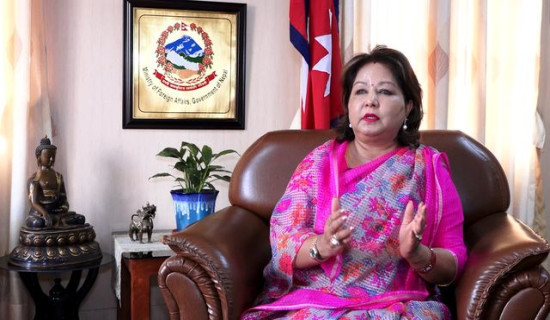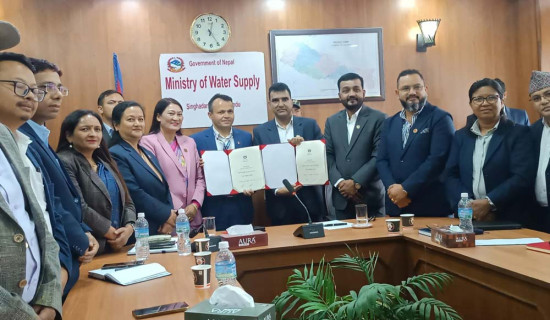- Saturday, 10 May 2025
Modi Eyeing Third Term
Our southern neighbour, known as the world's largest democracy, is currently holding general elections in staggering seven phases. The destiny of political parties competing in elections, for which around 970 million people out of a population of 1.4 billion are deemed eligible voters, will be known on June 4, when the ballots will be counted to determine the 543 members of the Lok Sabha, India's Lower House of the bicameral parliament. The sheer number of eligible voters is unprecedented in the history of elections held anywhere in the world. The ruling Bhartiya Janata Party (BJP) and its National Democratic Alliance (NDA) partners are expected to win elections, allowing incumbent Prime Minister Narendra Modi and his cabinet to serve a third term. PM Modi has been in office since 1914, much to the dismay of the opposition parties, particularly the Indian National Congress that ruled the country from 2004 to 2014.
Pre-poll forecasts
Though the incumbent BJP has been emphasising it would garner more than 400 seats, pre-poll forecasts indicate that the party would fall short of this goal since it lacks a strong base in many southern states where regional parties and the Congress may provide strong challenge. The BJP is expected to win enough seats in the northern and other states, which are considered the Hindi heartland, to secure a majority of 272 members in the Lower House. In 2019, the BJP and its National Democratic Alliance won 300 plus seats. Some BJP detractors have stated that the party would have a tough time repeating its performance of 2019.
Even though Modi's party, a pro-Hindu political organisation, is expected to win this time, the Modi-led administration has received criticism from numerous quarters, who claim that some 'government-induced' actions were implemented to influence the vote outcome in the party's favour. Aside from raising religious issues in the Hindu majority states by the BJP functionaries, the government has been accused of mobilising some departments against prominent leaders.
During the election year 2024, the Prime Minister took an active role in the construction of the Ram Temple in Ayodhya and then holding a Pran Prathista (life force infusion) ceremony in the idol of Lord Ram in a grand manner to impress on Hindu masses. This deed has captivated the hearts of many Hindus around the country, but it has also been described as a political gimmick to impress larger voter bases. In the meantime, the party has also been criticised for displaying anti-Muslim stances on several issues, thus infuriating secular parties like Congress and the secular section of the Indian society.
Similarly, the government has carried out several activities that have made it harder for opposition parties to defeat PM Modi's party. The Enforcement Directorate (ED) detained Delhi Chief Minister Arvind Kejriwal, a vocal opponent of Modi, shortly before the polls began on charges of giving out liquor licences illegally. Prior to CM Kejriwal’s ‘illegal’ imprisonment, key ministers from his Aam Aadmi party were imprisoned on similar charges. Jharkhand's Chief Minister Hemant Soren was also behind bars over corruption charges. Meanwhile, the ED has slapped tax worth billions of rupees on the Congress, a prominent opposition party, before freezing its bank account.
Detractors saw these actions as a tactic to weaken the opposition, preventing them from performing better in crucial polls. Earlier, the BJP-majority parliament suspended parliamentary membership of Rahul Gandhi, the face of the opposition fighting the ruling party. Gandhi was even dragged into a defamation case, and a state court slapped him with a two-year prison sentence, but the High Court overturned the lower court judgement. The opposition parties and various independent observers rapped the BJP and the party-led government's actions as undemocratic and, on occasions, illegal. Because of this, some expressed that India under the BJP has become an elected autocracy.
Despite criticism, it is also true that under Modi, India has made a tremendous jump towards becoming an economic powerhouse within a decade. India is currently the world's fifth largest economy, and PM Modi has claimed that during his third term, he intends to make India the world's third largest economy, trailing only the US and China. India's impressive economic growth is largely owing to its political and economic stability during the BJP rule, which has encouraged many multinational corporations to invest in India.
The Modi government has also invested heavily in developing highways, trains, and air networks, as well as in new infrastructure, transforming India into a worldwide investment destination. According to reports, India's place in global leadership has improved during Modi's tenure. India's participation in the United Nations, global and economic organisations such as the G-20 and BRICS, as well as global and regional security bodies, indicates India’s rising status.
Special fondness
As the BJP and PM Modi pursue a third term through the ongoing Lok Sabha elections, India’s close neighbours, including Nepal, will see no drastic changes in India's policy towards them. The BJP-led administration has a special fondness for Nepal, although several sources indicate that the party is dissatisfied with Nepal's transformation from a Hindu country to a secular one. Nepal will continue to benefit from all of India's assistance over next five years. However, India under PM Modi would be pleased that the Himalayan nation will not raise its long-pending boundary disputes. Nepal will press India to buy its surplus power while supplying it during dry seasons. Similarly, Nepal's tea exports to India have also faced challenges. Nepal wants to see such barriers removed at the earliest.
Many in India, including those in power, are allegedly unhappy with the recent government shift, in which two main communist parties — the UML and the CPN- Maoist Centre — play key roles. Nepal tried to resolve its border issue of Kalapini and Limpiyadhura in 2020 while the UML under KP Sharma Oli was in the government leadership, which India did not like. However, regarding other matters the ties between India and Nepal is predicted to remain cordial and unchanged when PM Modi returns to office for the third term.
(Upadhyay is former managing editor of this daily.)

















